How your beliefs and goals can create intentional parenting decisions.
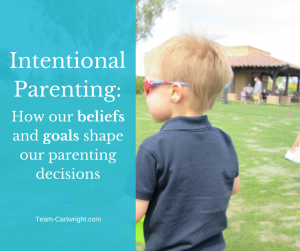
What are your parenting goals?
By that I don’t mean Make it to dinner time or Find the missing sippy cup. Think long-term, way beyond when your children are tiny and still under your direct care. What do you want for them? I think most parents want their kids to be good people. They want them to be nice, successful, happy. Can we get more specific than that? Do you want to raise someone who is trying to change the world? Someone who seeks out others to include instead of exclude? Maybe someone who is smart with money and lives within their means? These are things to think about.
What are your parenting beliefs?
No, I’m not talking about no dessert before you finish your carrots. Do you think kids should be seen but not heard? Should we be teaching our kids to get in touch with their feelings or do we worry there are too many ‘special snowflakes’ around for that? Are you dead set against spanking? How do you feel about cry it out?
You might be thinking, Wait, aren’t my goals and beliefs the same? They do have a lot in common. It makes sense that your goals are aligned with your beliefs and vice versa. But that doesn’t always mean they are the same thing. You might believe that children should defer to adults and not speak up in some situations, but have the goal of raising a child who stands up for themselves. When you think about it that way it might seem obvious that this goal and belief are going to be hard to work on simultaneously. Well, yes. It might not be impossible to get the two achieved, as speaking up has different levels of appropriateness in different situations. But overall it can create conflicting messages for our children.
Both goals and beliefs are important in raising our children. Beliefs are our intrinsic values. These are things like what we view as right or wrong. What do we place importance on and give respect to? Things like honesty, compassion, kindness- these are beliefs. Goals are what we want to achieve. These are results that come from action. Do you want your child to go to a certain college or enter a certain profession? Do you hope your child is a vegetarian? These two ideas- beliefs and goals- do overlap a lot, especially in the big things we want for our kids. I think it is safe to say most parents want to raise happy, successful adults. These fall into both belief and goal categories, so we need to be looking at both as we parent.
Okay, great. We know what these things are. But here in the weeds with little ones I need solutions for my problems fast. I don’t have time to sit around and think about what my long term goals are, I have immediate ones that need to be met! Why should I even worry about this? Let’s look at some examples.
If your child isn’t eating their veggies you can send them to their room until they do. This is a short term focus. It might make your kid eat in that moment. Does it mean they will willingly eat their veggies another time? Maybe, maybe not. More so, how does it make you feel as a parent? Does it leave you feeling guilty later? Are you questioning whether or not you are doing the right thing? There is a chance you could be stuck in a cycle of having to use punishment to get your desired result- eating the vegetables. Long term you might not see the results you want, and you might have to struggle through meal times for a long time.
It helps to ask yourself what are your true goals in this situation? Yes, the top goal is to have a healthy child. But more than that do you want your child to learn to eat in a healthy style or just to do what they are told? I don’t want to tell you which one is right. There is good reason to learn to eat right and there is something to be said for a child learning how to obey. But if you do want to teach your child to eat right because it is good for them, perhaps sending them to their room until they comply isn’t the best answer. Is your belief of healthy eating for life matching up with your actual real life goal- eating the darn veggies already? When these two things don’t line up it can be very hard to parent effectively.
Whys are the answer to what you believe. Why do you do what you do? It is so helpful to write these out. Think about the hard stuff. Why do I care what my kids eat? Why is religion important to me? Why do I want my children to have friends, and how should we handle those friendships? It really helps to sit down and think on these with your partner. These don’t have to be set in stone, you can change them in time. But having them in mind will help keep you focused on how you want to live your life and how you want your children to live theirs.
Your goals are your whats. What do you want your kids to do? These are both short term and long term. For example in the short term we want our kids to go to sleep already, long term we want them to understand how to soothe themselves and get enough rest. Both are important, and they will help shape each other.
Okay great, we know what are beliefs and goals are. What does that do for me? These two things lead you to the what and how. That is they help you see what is your parenting problem and how are you going to solve it. Some things might be problems simply because other people tell us they are. So we are trying to fix a problem that actually doesn’t go against our goals and beliefs. Recognizing that can save a lot of time and effort.
For example does your toddler only want to sleep in your bed with you? Some people will tell you that co-sleeping like that is detrimental to the family. (We are ignoring safety concerns of sleeping with babies for this, let’s assume that isn’t an issue.) So you are trying to find ways to encourage your toddler to sleep on their own. What if it doesn’t bother you though? No one in your family cares and no one is suffering from it. Your belief may be to provide whatever comfort and security measures your child wants and needs. Is your short term goal of getting your child out of your bed necessary? Maybe not. You might have a long term goal of getting your child out of your bed. But knowing what your beliefs are can help you find a course of action that reaches that goal in a different time frame.

Another good example is sleep training. Regardless which method you use it can be tough. Rocking your babies to sleep can be such a sweet time. But for me at least, it was something I knew I couldn’t do for long. With twins it just wasn’t practical. I had to find a way to get my babies to sleep on their own. What was my goal here? Well, get my babies to go to sleep on their own. (I know, I just said that, but bear with me in the process.) That’s a straight forward enough goal. There are many ways to reach that goal. You can try cry it out, the shush-pat method, gradual extinction, giving it time, the sleep shuffle, healthy sleep habits. The list goes on and on. How do you know which one to try? Check your beliefs.
If you believe that your child shouldn’t be left to cry no matter what, don’t try cry it out. It isn’t going to work for your family. This might seem like a no brainer but if you are surrounded by people who swear that this is the way to do it you might feel like you have to do it too. You might know a lot of attachment parents who think you should just give it time. Well you might believe that children really do need to sleep without their parents, and you need to be able to get some rest/tend to other kids/actually hang out with your partner, etc. Giving it time is just not the method for you. Taking the time to look at what you really believe will make whatever method you choose a little easier to bear. In my opinion sleep issues are rarely easy. There is going to be some point where you hit a wall and wonder if you are doing the right thing. Think of your beliefs. Really feeling that you are doing the right thing by teaching your child to sleep on their own will give you the strength to stay strong and get past that hurdle.
This holds true for more than just sleep issues. These issues pop up through our children’s lives. I think it is easy to not really consider your goals and beliefs in the early days when a lot of issues are pretty clear cut. At the end of the day we all want to get our kids to sleep and to eat healthy, so there isn’t a lot of stress on why you are helping them with that. But as our children grow and learn in life we are growing and learning in parenting. What are you going to do when your child comes to you with friend problems as middle schoolers. What if they are dealing with a bully? Do you advise them to turn the other cheek? Stand up for themselves? Embrace the bully or steer clear? This is a great time to sit and think about what you really want to teach your children. We all know life has a way of getting busier as the years go by. If you have already been practicing this method of looking at goals and beliefs it will be easier to fall back on that and make a carefully thought out decision. We take these early learning chances with our children as a time to practice for the really big stuff later in life.
Taking a look at your goals and beliefs is all about being intentional with your parenting. There is no one right way to parent. We all need to figure out what is right for our individual families. Because of this there isn’t one book or one line of thought that can tell you exactly what to do in any situation. You can use a simple pattern to find solutions that work for your family. Identify a problem. Figure out your goal for the situation. Consider your beliefs to decide on a course of action. Implement, then evaluate. You might need to go back and try a couple of solutions. But if you are keeping your goals and beliefs in mind you won’t find yourself running in circles getting no where.
Being intentional with parenting helps me be consistent, evaluate what I want to stress with my kids, and keep the big picture in mind. It helps my husband and I stay on the same page and work together when we face challenges. Keeping my goals and beliefs in mind actually helps eliminate some stress too. If an issue isn’t something that contradicts my beliefs, it is easier to let it go. If it is a challenging course of action to reach my goal, remembering my beliefs helps me to know I am doing the right thing for my family.
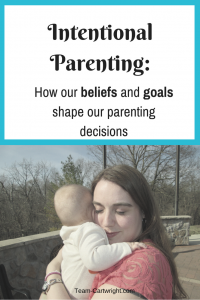
Now I have a challenge for you. Take some time and think about these big issues. What are your parenting beliefs? What are your goals for your children, both short and long term? There are of course many ways to do this, but I would encourage you to do more than just think about it. To start, take an evening and start to write out these things. I really think it is hard to take action on anything if you can’t even commit it to paper. Start just a brain dump of ideas. Ask yourself What are my goals for my children as adults? What are my major beliefs? Keep that paper handy for a few days and add to it. You’d be surprised what pops into your head after letting it sit in your brain a bit. Encourage your partner to do the same.
Once you both have your list sit down together and talk about what you have written. What are the biggies for your family? This isn’t about making sure you both agree on everything. Yes, it probably helps if you agree on the big guys (and even what those big guys are differs from family to family). But this isn’t about reaching a consensus, it’s about thinking through these ideas. It doesn’t hurt if you don’t agree on everything. If you are super in to healthy eating and believe it is very important while your partner is a little more neutral on it this lets you know you can take the reins on that one. If your partner has a big goal for your children to be financially savvy and that isn’t your strength, you know that your partner can do more of that teaching for your family.
I think beliefs and goals are fluid, they change with time. This exercise of writing down your beliefs and goals helps you to keep them in mind when you face parenting challenges. The more you practice considering them the easier it will be when you get to the really hard stuff.
Need some suggestions of what to even put on your list? Here are some key words to get your thinking. These are of course not the only areas to consider, the possibilities are endless.
Education, Ethics/Morality, Faith/Religion, Family Relationships, Finances, Friendships, Household Duties/Chores, Health/Physical Fitness, Manners, Virtues, Communication, Career, Lifestyle.
What are some of your big goals and beliefs for your kids? (And don’t forget to include kids in the goal setting as they get older!) I’d love to hear about them!

This weeks posts:
Monday: Chronicles of a Babywise Mom– How To Correct Your Preteen
Monday: Let’s Be Brave – How To Solve the “Wise in Their Own Eyes” Problem
Tuesday: Rogers Party of 5 – 5 Ways To Teach Children Kindness
Wednesday: Mama’s Organized Chaos – How To Give Instructions to Your Toddler & Achieve Successful Results
Thursday: Wiley Adventures – Temper Tantrums and the Happy Heart Rug
Friday: The Journey of Parenthood – How To Teach Your Children Self Control
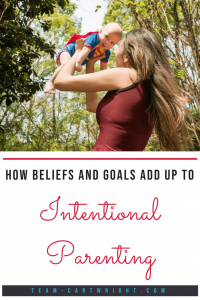

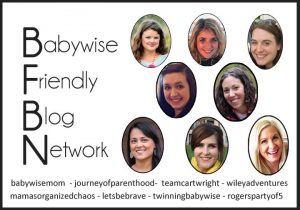
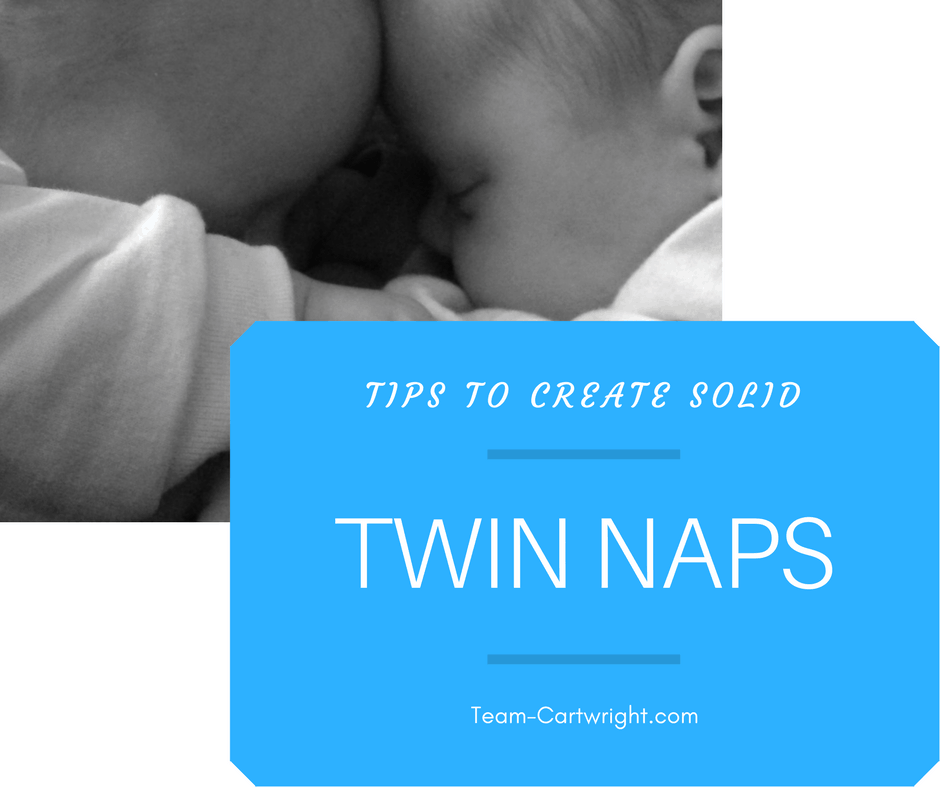

{BFBN blog swap} pacifiers and babywise: do they mix? - let's be brave.
Thursday 10th of August 2017
[…] it? In the short term, yes. You are introducing something that you are going to take away. But consider your bigger goals – teaching your child to self-soothe and sleep well. In that respect introducing this tool […]
{BFBN week} how to teach your children self-control. - let's be brave.
Wednesday 19th of July 2017
[…] Kimberly at Team Cartwright {Intentional Parenting: How Our Beliefs and Goals Shape Our Parenting Decisions} and Caitlin at Rogers Party of 5 {5 Ways to Teach Children […]
Jillynn
Monday 17th of July 2017
"Whys are the answers to what you believe LOVE IT FRIEND! And I love that you touched on the difference between training and discipline with the veggie talk;-) This post makes me think through those reasons for eating the vegetables, not being "mommy said so" but because I am raising people who will always have to answer to a higher authority, mainly God but employers, teachers, parents, etc. and if they are allowed to "get away with murder" in my home, they will think they can "get away with murder" someday when they are older and not living under my roof. Love the reminders friend! Great post!
How to Teach Your Children Self Control - Rogers Party of 5
Friday 14th of July 2017
[…] – Intentional Parenting: How Our Beliefs and Goals Shape Our Parenting Decisions – Kimberly – Team […]
BFBN Week: How to teach your children self control – Twinning Babywise
Friday 14th of July 2017
[…] TEAM CARTWRIGHT INTENTIONAL PARENTING […]